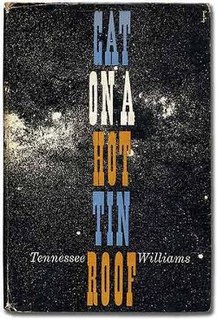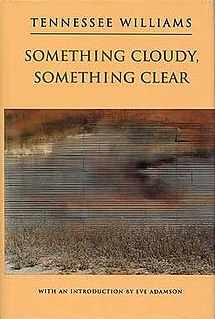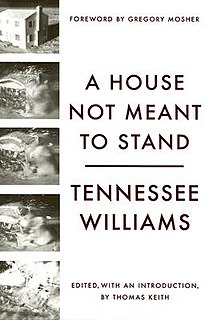
Cat on a Hot Tin Roof is a play by Tennessee Williams. One of Williams's more famous works and his personal favorite, the play won the Pulitzer Prize for Drama in 1955. Set in the "plantation home in the Mississippi Delta" of Big Daddy Pollitt, a wealthy cotton tycoon, the play examines the relationships among members of Big Daddy's family, primarily between his son Brick and Maggie the "Cat", Brick's wife.

Suddenly Last Summer is a one-act play by Tennessee Williams. It opened off Broadway on January 7, 1958, as part of a double bill with another of Williams' one-acts, Something Unspoken. The presentation of the two plays was given the overall title Garden District, but Suddenly Last Summer is now more often performed alone. Williams said he thought the play "perhaps the most poetic" he had written, and Harold Bloom ranks it among the best examples of the playwright's lyricism.

Autofellatio is the act of oral stimulation of one's own penis as a form of masturbation. Only a limited number of men are physically capable of performing autofellatio.

The International Union, United Automobile, Aerospace, and Agricultural Implement Workers of America, better known as the United Automobile Workers (UAW), is an American labor union that represents workers in the United States and Canada. It was founded as part of the Congress of Industrial Organizations (CIO) in the 1930s and grew rapidly from 1936 to the 1950s. The union played a major role in the liberal wing of the Democratic party under the leadership of Walter Reuther. It was known for gaining high wages and pensions for auto workers, but it was unable to unionize auto plants built by foreign-based car makers in the South after the 1970s, and it went into a steady decline in membership; reasons for this included increased automation, decreased use of labor, movements of manufacturing, and increased globalization.
Slut is generally a term for a woman or girl who is considered to have loose sexual morals or who is sexually promiscuous. It is usually used as an insult, sexual slur or offensive term of disparagement (slut-shaming). It originally meant "a dirty, slovenly woman", and is rarely used to refer to men, generally requiring clarification by use of the terms male slut or man whore.

Gil Vicente, called the Trobadour, was a Portuguese playwright and poet who acted in and directed his own plays. Considered the chief dramatist of Portugal he is sometimes called the "Portuguese Plautus," often referred to as the "Father of Portuguese drama" and as one of Western literature's greatest playwrights. Also noted as a lyric poet, Vicente worked in Spanish as much as he worked in Portuguese and is thus, with Juan del Encina, considered joint-father of Spanish drama.

Teorema is a 1968 Italian allegorical mystery film written and directed by Pier Paolo Pasolini and starring Terence Stamp, Laura Betti, Silvana Mangano, Massimo Girotti and Anne Wiazemsky. Pasolini's sixth film, it was the first time he worked primarily with professional actors. In this film, an upper-class Milanese family is introduced to, and then abandoned by, a divine force. Two prevalent motifs are the desert and the timelessness of divinity.
In psychoanalytic literature, a Madonna–whore complex is the inability to maintain sexual arousal within a committed, loving relationship. First identified by Sigmund Freud, under the rubric of psychic impotence, this psychological complex is said to develop in men who see women as either saintly Madonnas or debased prostitutes. Men with this complex desire a sexual partner who has been degraded while they cannot desire the respected partner. Freud wrote: "Where such men love they have no desire and where they desire they cannot love." Clinical psychologist Uwe Hartmann, writing in 2009, stated that the complex "is still highly prevalent in today's patients".
Da is a 1978 comedy play by Irish playwright Hugh Leonard.

Berlin: Symphony of a Metropolis or Berlin: Symphony of a Great City is a 1927 German silent film directed by Walter Ruttmann, co-written by Carl Mayer and Karl Freund. Composer Edmund Meisel was commissioned to write an orchestral score for its original release.

Something Cloudy, Something Clear is an autobiographical play by Tennessee Williams that was originally written in 1941 as a short play titled The Parade, or Approaching the End of a Summer, which was produced posthumously in Provincetown in 2006. In 1962, Williams retitled and expanded The Parade into a full-length play that was first produced Off-Off-Broadway in 1981. Both versions of the play are set on the wharfs of Provincetown, Massachusetts, and tell the story of a young playwright named August dealing with his unrequited homosexual love for another man.

A House Not Meant to Stand is the last play written by Tennessee Williams. It was produced during the 1981–82 season at the Goodman Theatre in Chicago by Gregory Mosher and published for the first time in 2008 by New Directions. with a foreword by Gregory Mosher and an Introduction by Thomas Keith.
An auto-da-fé is a Roman Catholic church ritual which became associated with its use during the Spanish Inquisition.

Penis envy is a stage theorized by Sigmund Freud regarding female psychosexual development, in which young girls experience anxiety upon realization that they do not have a penis. Freud considered this realization a defining moment in a series of transitions toward a mature female sexuality and gender identity. In Freudian theory, the penis envy stage begins the transition from an attachment to the mother to competition with the mother for the attention, recognition and affection of the father. The parallel reaction of a boy's realization that women do not have a penis is castration anxiety.

An auto-da-fé or auto-de-fé was the ritual of public penance of condemned heretics and apostates that took place when the Spanish Inquisition, Portuguese Inquisition or the Mexican Inquisition had decided their punishment, followed by the carrying out by the civil authorities of the sentences imposed.

Nowaki is a short Japanese novel by Natsume Sōseki (1867–1916). Written in 1907, the novel was published in the magazine Hototogisu in January. The year 1907 was a turning point in the author’s life when he left his Tokyo University teaching position to write full-time for the daily Asahi Shimbun. He also serialized the novel Gubijinsō (虞美人草) the same year.

Benjamin Percy Williams was a British character actor from the 1930s to the late 1950s. During his career he appeared in 137 films. In 1954 Williams acted in the BBC Radio play Under Milk Wood that won the Prix Italia award for radio drama that year.
A memory play is a play in which a lead character narrates the events of the play, which are drawn from the character's memory. The term was coined by playwright Tennessee Williams, describing his work The Glass Menagerie. In his production notes, Williams says, "Being a 'memory play', The Glass Menagerie can be presented with unusual freedom of convention." In a widening of the definition, it has been argued that Harold Pinter's plays Old Times, No Man's Land and Betrayal are memory plays, where "memory becomes a weapon". Brian Friel's Dancing at Lughnasa is a late 20th-century example of the genre.













